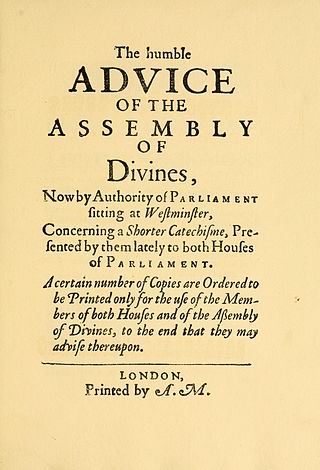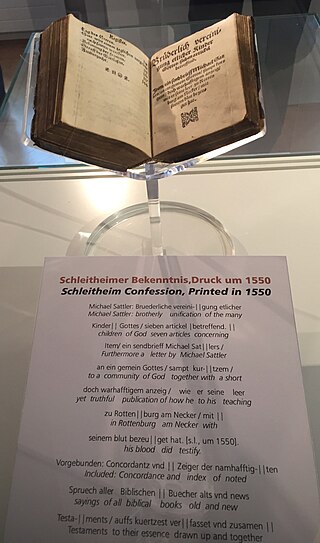To be born again, or to experience the new birth, is a phrase, particularly in evangelicalism, that refers to a "spiritual rebirth", or a regeneration of the human spirit. In contrast to one's physical birth, being "born again" is distinctly and separately caused by the operation of the Holy Spirit, and it occurs when one is baptized in water. It is a core doctrine of the denominations of the Anabaptist, Moravian, Methodist, Baptist, Plymouth Brethren and Pentecostal Churches along with all other evangelical Christian denominations. All of these Churches strongly believe Jesus's words in the Gospels: "You must be born again before you can see, or enter, the Kingdom of Heaven". Their doctrines also mandate that to be both "born again" and "saved", one must have a personal and intimate relationship with Jesus Christ.

Reformed Christianity, also called Calvinism, is a major branch of Protestantism that began during the sixteenth-century Protestant Reformation, a schism in the Western Church. In the modern day, it is largely represented by the Continental, Presbyterian, and Congregational traditions, as well as parts of the Anglican and Baptist traditions.
Justificatio sola fide, meaning justification by faith alone, is a soteriological doctrine in Christian theology commonly held to distinguish the Lutheran and Reformed traditions of Protestantism, among others, from the Catholic, Eastern Orthodox, Oriental Orthodox, Assyrian and Anabaptist churches. The doctrine asserts that it is on the basis of faith alone that believers are made right of sin ; and not on the basis of what Paul the Apostle calls "works of the law", which sola fide proponents interpret as including not only moral, legal or ceremonial requirements but any good works or "works of charity."

The Westminster Confession of Faith, or simply the Westminster Confession, is a Reformed confession of faith. Drawn up by the 1646 Westminster Assembly as part of the Westminster Standards to be a confession of the Church of England, it became and remains the "subordinate standard" of doctrine in the Church of Scotland and has been influential within Presbyterian churches worldwide.

A catechism is a summary or exposition of doctrine and serves as a learning introduction to the Sacraments traditionally used in catechesis, or Christian religious teaching of children and adult converts. Catechisms are doctrinal manuals – often in the form of questions followed by answers to be memorised – a format that has been used in non-religious or secular contexts as well. According to Norman DeWitt, the early Christians appropriated this practice from the Epicureans, a school whose founder Epicurus had instructed to keep summaries of the teachings for easy learning. The term catechumen refers to the designated recipient of the catechetical work or instruction. In the Catholic Church, catechumens are those who are preparing to receive the Sacrament of Baptism. Traditionally, they would be placed separately during Holy Mass from those who had been baptized, and would be dismissed from the liturgical assembly before the Profession of Faith and General Intercessions.

Reformed Baptists, Particular Baptists and Calvinistic Baptists, are Baptists that hold to a Calvinist soteriology. Depending on the denomination, Calvinistic Baptists adhere to varying degrees of Reformed theology, ranging from simply embracing the Five Points of Calvinism, to accepting a modified form of federalism; all Calvinistic Baptists reject the classical Reformed teaching on infant baptism as a sign and seal of the covenant of grace. The first Calvinistic Baptist church was formed in the 1630s. The 1689 Baptist Confession of Faith is a significant summary of the beliefs of Reformed Baptists. The name "Reformed Baptist" dates from the latter part of the 20th century to denote Baptists who retained Baptist ecclesiology, and reaffirmed Reformed biblical theology, such as Covenant theology.

The Westminster Shorter Catechism is a catechism written in 1646 and 1647 by the Westminster Assembly, a synod of English and Scottish theologians and laymen intended to bring the Church of England into greater conformity with the Church of Scotland. The assembly also produced the Westminster Confession of Faith and the Westminster Larger Catechism. A version without Scripture citations was completed on 25 November 1647 and presented to the Long Parliament, and Scripture citations were added on 14 April 1649.

Anabaptist theology, also known as Anabaptist doctrine, is a theological tradition reflecting the doctrine of the Anabaptist Churches. The major branches of Anabaptist Christianity agree on core doctrines but have nuances in practice. While the adherence to doctrine is important in Anabaptist Christianity, living righteously is stressed to a greater degree.

Covenant theology is a Biblical Theology, a conceptual overview and interpretive framework for understanding the overall structure of the Bible. It is often distinguished from dispensational theology, a competing form of biblical theology. It uses the theological concept of a covenant as an organizing principle for Christian theology. The standard form of covenant theology views the history of God's dealings with mankind, from Creation to Fall to Redemption to Consummation, under the framework of three overarching theological covenants: those of redemption, of works, and of grace.
The Confession of Faith (1689), also known as the 1689 Baptist Confession of Faith, or the Second London Baptist Confession of Faith, is a Particular Baptist confession of faith. It was written by English Baptists who subscribed to a Calvinistic soteriology as well as to a covenantal systematic theology. Because it was adopted by the Philadelphia Association of Baptist Churches in the 18th century, it is also known as the Philadelphia Confession of Faith. The Philadelphia Confession, however, was a modification of the Second London Confession; it added an allowance for the singing of hymns, psalms, and spiritual songs in the Lord's Supper and made optional the laying on of hands in baptism.

The reformed confessions of faith are the confessional documents of various Reformed churches. These express the doctrinal views of the churches adopting the confession. Confessions play a crucial part in the theological identity of reformed churches, either as standards to which ministers must subscribe, or more generally as accurate descriptions of their faith. Most confessions date to the 16th and 17th century.
John Spilsbury was an English cobbler and Particular Baptist minister who set up a Calvinist Baptist church in London in 1638.

Benjamin Keach was an English Reformed Baptist preacher and author whose name was given to Keach's Catechism.
Baptist beliefs are not completely consistent from one church to another, as Baptists do not have a central governing authority. However, Baptists do hold some common beliefs among almost all Baptist churches.

An ordinance is a term used by certain Christian denominations for a religious ritual that was instituted by Jesus for Christians to observe.

A sacrament is a Christian rite that is recognized as being particularly important and significant. There are various views on the existence, number and meaning of such rites. Many Christians consider the sacraments to be a visible symbol of the reality of God, as well as a channel for God's grace. Many denominations, including the Roman Catholic, Lutheran, Presbyterian, Anglican, Methodist, and Reformed, hold to the definition of sacrament formulated by Augustine of Hippo: an outward sign of an inward grace, that has been instituted by Jesus Christ. Sacraments signify God's grace in a way that is outwardly observable to the participant.

The regulative principle of worship is a Christian doctrine, held by some Calvinists and Anabaptists, that God commands churches to conduct public services of worship using certain distinct elements affirmatively found in scripture, and conversely, that God prohibits any and all other practices in public worship. The doctrine further determines these affirmed elements to be those set forth in scripture by express commands or examples or, if not expressed, those implied logically by good and necessary consequence. The regulative principle thus provides a governing concept of worship as obedience to God, identifies the set of specific practical elements constituting obedient worship, and identifies and excludes disobedient practices.
Protestant theology refers to the doctrines held by various Protestant traditions, which share some things in common but differ in others. In general, Protestant theology, as a subset of Christian theology, holds to faith in the Christian Bible, the Holy Trinity, salvation, sanctification, charity, evangelism, and the four last things.









